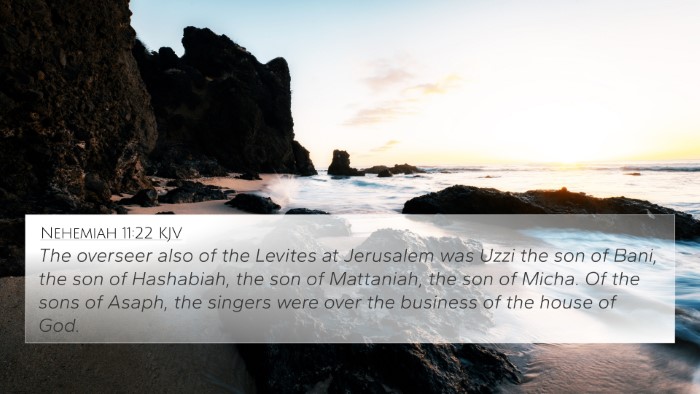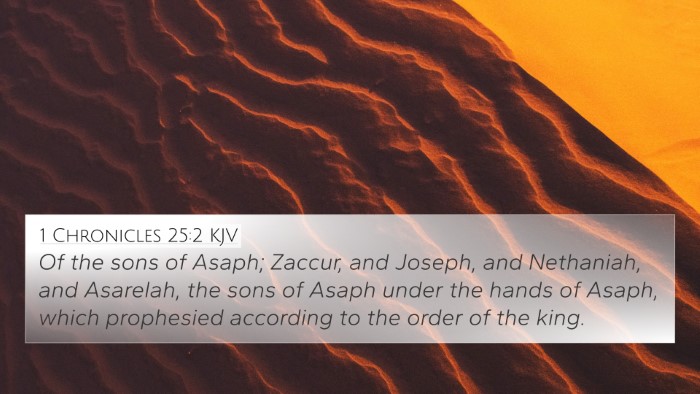Meaning and Interpretation of 1 Chronicles 9:15
Verse Text: "And Zichri the son of Mali, the son of Abdi, the son of Jonathan, and their brethren, the Levites, were over the work of the service of the house of God." - 1 Chronicles 9:15
Overview
The verse signifies an important genealogical and functional place for the Levites in relation to the House of God. It emphasizes the roles of Zichri and his brethren in serving in the temple, reflecting the essential duties assigned to the Levites in the religious life of Israel.
Commentary Insights
This section presents combined insights from Matthew Henry, Albert Barnes, and Adam Clarke:
-
Matthew Henry:
Henry emphasizes the heritage of Zichri, tracing his lineage to show the significance of priestly families. He notes that those serving in the temple had deep roots in the faith, which reflects God's choice for ministry. The work of service in the House of God is portrayed not merely as a duty but as a divine honor bestowed upon them.
-
Albert Barnes:
Barnes draws attention to the structure of the Levite service and how it highlights the organization and dedication required in worship. He notes that the Levites were not only instrumental in temple functions but also represented a spiritual lineage that connected the worship of Israel with their historical covenant with God.
-
Adam Clarke:
Clarke elaborates on the importance of the Levites in maintaining the sanctity and order of the worship settings. He suggests that their roles extended beyond mere physical duties; they symbolized the ongoing presence of God within the community. Clarke relates this verse to the broader themes of service and dedication central to Yahweh's covenant with Israel.
Bible Cross References
This verse connects with several other scriptures that highlight similar themes of service, lineage, and the significance of the Levitical priesthood. Below are 10 relevant cross-references:
- Numbers 3:6-10: Details the appointment of the Levites as substitutes for the first-born in Israel.
- 1 Chronicles 6:48-49: Talks about the responsibilities of the Levites in relation to the tabernacle and the temple.
- 1 Peter 2:9: Refers to believers as a royal priesthood, paralleling the roles of the Levites.
- Exodus 28:1: Discusses the consecration of Aaron and his sons, establishing the priestly lineage.
- Leviticus 10:3: Indicates the importance of holiness and proper conduct in service to God.
- Hebrews 7:11-12: Talks about the priesthood of Melchizedek and the changes in the Levitical order.
- Nehemiah 10:38: Describes the Levites’ roles in the renewal of the covenant.
- Ezra 3:8-10: Chronicles the rebuilding of the temple and the roles of the Levites in that context.
- John 4:23-24: Highlights the idea of worshiping God in spirit and truth, a connection back to the Levites' service.
- Psalm 134:1: A song of ascents discussing the ministers of the temple and their duty to bless the Lord.
Thematic Connections
This verse exemplifies critical themes in the Bible related to divine service, the sanctity of worship, and the importance of lineage in religious duties.
Service and Dedication
The Levites’ roles encapsulate the Biblical ethos of service to God, drawing parallels to the New Testament understanding of serving others and dedicating one's life to God’s work.
Lineage and Heritage
The genealogical emphasis denotes how heritage plays a role in God’s plan, emphasizing the continuity of worship practices passed through generations.
Spiritual Calling
This verse serves as a reminder that all believers are called to a place of service, much like the Levites, connecting the Old Testament’s structure of worship with the call for modern believers to engage in the work of God’s kingdom.
Conclusion
The examination of 1 Chronicles 9:15 reveals significant biblical truths regarding lineage, service, and the enduring lessons of the Levites’ dedication to God. The thorough cross-referencing of related scriptures enhances understanding, revealing an inter-Biblical dialogue that enriches the significance of temple service and its implications for contemporary faith practices.
In summary, when engaging in Bible cross-referencing, one can better appreciate the connections between various Bible verses that relate to each other and deepen their understanding of God’s call through generations.









